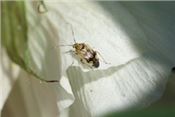New Technology Could Improve Insect Control In Cotton
JACKSON, TENN.
A new biotech trait currently in the development stage could provide improved control of thrips and plant bugs in cotton, according to researchers with the University of Tennessee Institute of Agriculture.
The new Bt (Bacillus thuringiensis) technology, which is being developed by Monsanto, is commonly referred to as the “Lygus trait” because it was originally developed to protect cotton from tarnished plant bugs (a Lygus species). However, during field-testing, researchers also noted effects on thrips injury. Tarnished plant bugs and thrips are the two most damaging insects in Mid-South cotton production.
“Our evaluations showed that this Bt trait provided better plant protection than the best alternative control strategy,” says Scott Stewart, Integrated Pest Management Coordinator with UTIA. “These findings have many people pretty excited.”
Crops with a Bt trait, have been modified to produce a protein that helps the plant mitigate the impact of certain insects while also decreasing the need for insecticide applications. In recent evaluations, the untreated Bt cotton exhibited less thrips damage than non-traited cotton that had received both an insecticide seed treatment and a foliar insecticide application. This was true in both an early and late-planted test.
While this new trait is not commercially available, Stewart says the development of new insect control measures is especially timely. There is increasing resistance of thrips to insecticide seed treatments, and Temik, the old standard insecticide for thrips control in cotton, was withdrawn from the market in 2011.
“It’s impressive technology, and it’s important to us now because we’re seeing issues with seed treatments controlling thrips,” Stewart says. He adds that in-depth evaluations of the new Bt trait will continue at UT AgResearch and Education Centers in Jackson and Milan, Tennessee.
Scott Graham, graduate student in UT’s Department of Entomology and Plant Pathology, presented the findings March 14 at the Entomological Society of America’s Southeastern Branch Annual Meeting in Raleigh, North Carolina. The presentation was titled, “The impact of a new Bt cotton trait on thrips and their injury in seedling cotton.” The research was partially supported by the Monsanto Company. ∆

UTIA researchers are conducting ongoing evaluations of new technology
that could improve control of the two most damaging insects in Mid-South
cotton production – tarnished plant bugs (pictured) and thrips.
Photo by S. Stewart, courtesy UTIA.